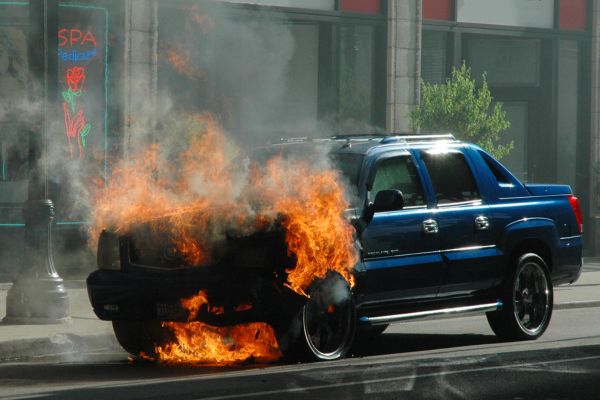When it comes to car safety, many drivers think about seat belts and airbags. But did you know that neglecting fire hazards can put you and your family at risk? The good news is with regular vehicle checks and some simple precautions, you can significantly reduce potential fire dangers. Here, we’re taking a few minutes to discuss the most common culprits of fire risks in cars and highlighting how to avoid them.
Faulty Electrical Systems
You might not think much about your car’s electrical system, but it can be a major fire risk if not maintained. Over time, wires become worn or damaged due to age or exposure to heat and moisture. These problems lead to sparks or short circuits.
To minimize this risk, have a qualified mechanic inspect your electrical system regularly. Look for any signs of wear, such as fraying wires or loose connections. Addressing these issues promptly can prevent potential fire hazards before they escalate.
Flammable Liquids and Materials
It’s easy to overlook the potential danger of storing flammable materials inside your vehicle. Whether it’s a can of gasoline for your lawnmower, aerosol spray cans, or even cleaning supplies, these items can easily ignite under the right conditions.
To keep your car safe, remove any unnecessary flammable materials immediately. If you must transport them, consider using a sturdy, ventilated container designed for such purposes. Always park your car in shaded areas to reduce heat buildup inside the vehicle.
Overheated Engines
An overheating engine is a performance issue and a common culprit of fire risks in cars. Engines can overheat for several reasons, including low coolant levels, a malfunctioning thermostat, or a failing water pump. When the engine overheats, it can ignite nearby flammable materials and lead to a fire.
Regularly check your vehicle’s coolant levels and schedule maintenance checks to make sure your engine cooling system is functioning correctly. If your engine starts to overheat, pull over immediately, turn off the engine, and call for assistance. Addressing overheating issues promptly can mitigate fire risks and keep you safe on the road.
Short Circuits
Short circuits can happen when electrical wires wear out or become damaged, causing them to connect improperly and create sparks. This is especially likely in older vehicles or those modified with aftermarket electrical components.
To reduce the risk of short circuits, have your vehicle’s electrical system checked regularly by a professional. Look for any signs of wear or damage, such as frayed wires or loose connections, and address them promptly. Avoid overloading your electrical system by not using too many aftermarket accessories simultaneously.
The Risks of Using Incompatible Electrical Wires
Using incompatible electrical wires in your vehicle can lead to overheating and eventually catch fire. This often happens when you make modifications without considering the original specifications of the vehicle’s wiring system.
It’s essential to ensure any replacements or additions are compatible with your car. Consult with a professional mechanic before you make electrical decisions for your vehicle to prevent incompatible wiring.
Recognize the signs your car needs some TLC and consider hiring professionals to take over the service or updates. There might be too much risk by overlooking these critical components, and you don’t want to risk a fire hazard for yourself or your family.



